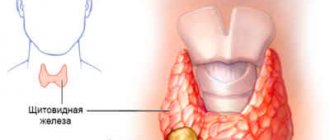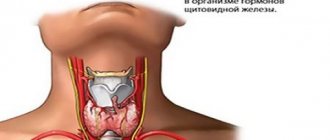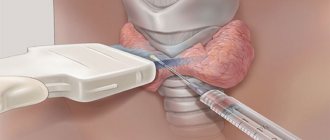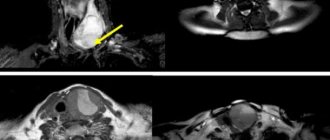According to statistics, problems with the thyroid gland are observed in more than a million Russians. Moreover, half of them do not even think about the impending threat. Hypothyroidism or weak (insufficient) thyroid function accounts for 90% of all thyroid diseases. Without treatment, the disease leads to metabolic disorders, cardiac and respiratory failure, ending in hypothyroid coma.
Appointment with an endocrinologist - 1000 rubles. Comprehensive ultrasound of the thyroid gland - 1000 rubles. Appointment based on ultrasound or test results - 500 rubles (optional)
The role of the thyroid gland in the body
The content of the article
The thyroid gland is located in the center of the neck and has a butterfly shape - it is the main gland that regulates metabolism in the body. A person’s overall well-being depends on how well the thyroid gland functions. The activity of the organ is interconnected with all body systems: if the thyroid gland malfunctions, the patient feels it, although he cannot always understand why he feels bad.
In order not to miss the disease in yourself and your loved ones, familiarize yourself with the symptoms of hypothyroidism.
What role do thyroid hormones play?
Hormones of all endocrine organs regulate metabolic processes in the body, influencing the speed and intensity of enzymatic reactions. However, each of them also has a specific direction of its action. True, thyroid hormones act in the same way, but triiodothyronine is several times more active than thyroxine.
- Both hormones increase tissue oxygen demand and are involved in the formation of high-energy chemical compounds containing phosphorus. They also increase protein synthesis and enhance growth processes.
- Under the control of thyroid hormones, fetal development and differentiation of its tissues, in particular the skeletal system, occur. The development and functional state of the nervous system also largely depend on the state of the thyroid gland.
- Thyroid hormones affect metabolic processes in the skin, cardiovascular system, liver, kidneys, and gastrointestinal tract.
Why take hormone tests? How does the thyroid gland work?
The thyroid gland produces hormones that are responsible for many processes in the body. Its activity is closely related to the activity of the hypothalamus and pituitary gland. Hypothalamic thyrotropin-releasing hormone (TRH) stimulates the synthesis and secretion of pituitary thyrotropin (TSH). In turn, TSH stimulates the production and release of T4 and T3 hormones from the thyroid gland. When enough T4 is produced, TRH and TSH signal that everything is normal in the body. About 85% of the hormones produced by the thyroid gland are T4 in an inactive form. A small amount of it is converted into T3, the active form of thyroid hormone. Next, T3 is converted to free T3 (FT3) or reverse T3 (RT3). This is free T3, which is of great importance to the body because it is the only hormone that can attach to receptors and increase metabolism. Thanks to this, the body retains heat, maintains the functioning of the gastrointestinal tract and brain, and keeps other hormones under control.
The role of reverse T3 has not yet been fully studied, however, it is known that its concentration decreases under severe stress and during mercury poisoning.
The most common form of hypothyroidism is Hashimoto's thyroiditis. This is a severe autoimmune disease in which the body rejects its own cells. The number of cases of Hashimoto's thyroiditis is increasing every year. This disease can only be determined by testing for thyroid hormones, determining thyroid peroxidase antibodies (TPOAb) and thyroglobulin antibodies (TgAb).
Thyroid functions
There have been the most contradictory ideas about the activity of the thyroid gland for several centuries. The first scientific data were closely related to the achievements of chemistry.
In 1916, the first thyroid hormone, thyroxine, was isolated, and soon it began to be produced synthetically. In 1950-1951, it was possible to decipher its second hormone - triiodothyronine. It turned out that both hormones contain iodine; the activity of the thyroid gland and the condition of the whole organism depend on its metabolic transformations.
The use of radioactive iodine made it possible to study in detail the processes of iodine metabolism in the body. Radioactivity makes this element "labeled". With the help of special devices, you can very accurately trace the path of “labeled” iodine and learn about the functional state of the thyroid gland.
There are approximately 20-30 milligrams of iodine in our body, and about a third of it is concentrated in the thyroid gland. This supply must be replenished daily with iodine contained in food and water. Iodine in the gastrointestinal tract is absorbed into the blood, and from there it enters the thyroid gland, where it is used to form thyroxine and triiodothyronine.
Hormones produced in the thyroid gland by the bloodstream are distributed throughout the body, enter every cell and participate in metabolism. After the destruction of hormones in cells, iodine is released and again goes into their construction.
Why is hypothyroidism so common?
Many symptoms of thyroid imbalance are vague, and most patients simply do not pay attention to them, attributing the malaise to banal fatigue, a mild cold, and other reasons. Doctors who prescribe a minimum of tests are also to blame. For example, most clinics only test for TSH and T4, when they should also test for FT3, RT3 or thyroid antibodies.
In the first stages, the pathology can be easily eliminated with drugs containing iodine and other elements that stimulate the thyroid gland. An advanced disease takes a lifetime to treat—patients have to constantly take hormonal medications to replace the missing hormones.
What are the dangers of thyroid dysfunction?
The thyroid gland, like all endocrine organs, is controlled by the central nervous system, and in particular the hypothalamus. Its neurosecrets (“implementing” factors) regulate the activity of the pituitary gland.
The pituitary thyroid-stimulating hormone (TSH) then regulates iodine metabolism in the body, the synthesis of thyroid hormones of the thyroid gland and their entry into the blood.
Deviations from the normal activity of the thyroid gland can cause various diseases. Some of them are characterized by increased synthesis of thyroid hormones, others, on the contrary, by decreased synthesis.
The first group of diseases is united under the general name “hyperthyroidism” or “thyrotoxicosis”, the second is “hypothyroidism”.
Patients suffering from thyrotoxicosis begin to quickly lose weight, their pulse quickens, sometimes their body temperature rises, irritability and excessive sweating appear. In some patients, exophthalmos can be observed (from the Greek word exophthalmos - goggle-eyed).
Such patients are treated with medications or surgery. Its purpose is to limit the excess production of thyroid hormones.
Hypothyroidism is accompanied by lethargy, dry skin, low body temperature, rare pulse, and swelling.
It must be remembered that during puberty the demands on the thyroid gland increase significantly, and it may enlarge. This is not a disease, but an adaptive reaction of a young organism, which disappears without a trace when the maturation period ends.
Where to get tested for thyroid hormones and undergo an ultrasound of the thyroid gland in St. Petersburg
A comprehensive endocrinological examination is carried out at the Diana specialized clinic in St. Petersburg. There is an expert ultrasound machine of the latest generation, and an ultrasound of the thyroid gland will cost only 1000 rubles. An appointment with an endocrinologist with the highest qualification category also costs 1,000 rubles. Interpretation of ultrasound with consultation (optional) - 500 rubles.
If you find an error, please select a piece of text and press Ctrl+Enter
How the thyroid gland and endocrinology are related
The content of the article
Endocrinology deals with the identification and treatment of diseases associated with disruption of hormone production in the human body. And since the thyroid gland ensures the production of hormones necessary for normal life, endocrinology and the thyroid gland have a close relationship.
Deviations in the functioning of this organ account for more than a third of all endocrine pathologies. The remaining 60% are sexual hormonal abnormalities and diabetes.
What thyroid diseases does an endocrinologist treat?
During the examination and diagnostic procedures, the following pathologies of the thyroid gland can be diagnosed, the treatment of which is carried out by an endocrinologist:
- Hyperthyroidism;
- Hypothyroidism;
- Thyroid adenoma (papillary, oxyphilic, atypical, follicular);
- Autoimmune thyroiditis;
- Endemic or diffuse toxic goiter;
- Malignant tumors of the thyroid gland.
The reason to consult a doctor is one or more symptoms indicating a malfunction of the thyroid gland:
- Sudden weight changes;
- Premature onset of menopause;
- Depression;
- Disruptions of the menstrual cycle;
- Constant feeling of tiredness and fatigue;
- Mood swings;
- Nervousness, irritability;
- Sleep problems;
- Problems with conception;
- Heart rhythm disturbances;
- Blood pressure surges.
Based on the patient’s complaints and visual examination, the endocrinologist can suggest a disease, and to clarify the diagnosis, he refers the patient to an ultrasound examination of the thyroid gland and blood tests.
Ultrasound diagnosis of the thyroid gland: norms and deviations
During ultrasound diagnostics, a specialist assesses the size of the thyroid gland, its structure, and also checks for the presence of formations and compactions and their echogenicity.
| Norms | Deviations |
| The thyroid gland of a healthy person is 2-4 cm long and 1.5-2 cm wide. | Reduced volume and size of the gland indicate hypothyroidism. |
| The volume depends on the patient’s body weight, so, with a weight of just over 50 kg, the volume is approximately 15.5 cc. If a person weighs about 100 kg, the volume of the gland can reach 32 cc. | Increased volume is a sign of diffuse goiter, as well as an infectious disease. |
| The contours are smooth and clear, the lobes are symmetrical | A formation with increased echogenicity is a cyst. A heterogeneous structure may be a sign of diffuse goiter, malignant formations, or cysts. Hypoechoic zones may indicate an inflammatory process. |
Possible complications
Thyroid puncture is rarely accompanied by complications. Ultrasound-assisted navigation makes this procedure even safer. Cases of spread of a malignant tumor due to needle insertion, damage to neighboring organs, nerves, and blood vessels are practically never encountered.
Most often, after a fine-needle biopsy, pain occurs and the color of the skin at the injection site changes slightly. But even small hemorrhages on the skin are rare. Isolated cases have been described in which bleeding developed into the cyst, and because of this it had to be removed.
If the rules of asepsis and antisepsis are followed, the risk of infection is also extremely unlikely.
We will call you back, leave your phone number
Message sent!
expect a call, we will contact you shortly
Laboratory tests (norms and deviations)
If a thyroid pathology is suspected, a specialist will prescribe laboratory blood tests that will show the level of hormones in the human body.
There are quite a few such analyzes:
- Thyroid-stimulating hormone (TSH);
- Triiodothyronine (T3) free;
- Triiodothyronine (T3) total;
- Thyroxine (T4) free;
- Thyroxine (T4) general;
- Thyroglobulin (TG);
- Antibodies to thyroid peroxidase (Ab to TPO);
- Antibodies to TG;
- Antibodies to TSH receptors.








